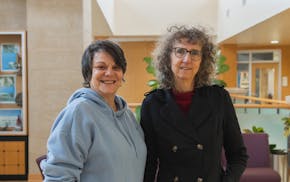I adore my friend Nancy. She's witty and sarcastic and gets things done. She can speak multiple languages and is rearing two beautiful girls and a photogenic Jack Russell. She's the first human you should enlist in the face of a daunting project because she'll fire off a plan, and off she goes before you can even sharpen your pencil.
But as much as I admire her character and value our friendship, she is not me.
I repeat: We. Are. Two. Separate. People.
Nancy Yang is an Asian American journalist from the Twin Cities, and I've been lucky to work with her on and off for the past 18 years. A few months ago she started a job as a senior audience editor for the Star Tribune, which means once again we are colleagues — and once again we almost certainly will be confused for each other.
This is far from a singular phenomenon. Any Asian can tell you about having to navigate clueless co-workers who've mixed them up for The Other Asian. And it goes far beyond the workplace.
Last month, comedian and actor Ali Wong announced that she and her husband, Justin Hakuta, were getting a divorce. Parade magazine and MSN reported on the breakup, but they both incorrectly blasted out pictures of Asian American actor Randall Park rather than Hakuta. Meanwhile in New York, while covering a vigil for murder victim Christina Yuna Lee, ABC News misidentified a community activist in attendance as Michelle Go, another Asian woman violently killed in the city.
Nancy and I have now worked in three different news organizations. We've become so inured to being mistaken for the other that I joke she is my industry doppelgänger, even though we don't look alike. While we both have straight black hair, she is five years younger, a few inches shorter, has a darker skin tone and is infinitely more stylish.
I cringe-laughed when a colleague sent her an e-mail but topped it with the greeting, "Hi, Laura." Which means the sender knew Nancy was Nancy when they manually typed in the e-mail address — but forgot it by the time they started writing the note.
With some offenders, though, the problem persists despite repeated corrections. We once had a team member who legitimately could not set us apart.
"And every single time, I had different responses," Nancy recalled. "Sometimes I just ignored it, silently hoping that because I wasn't responding, they would recognize it. That didn't work. There were a couple of times where I was gently corrective, like, 'I think you mean Laura.' That didn't work."
Then one day this person stood up and barked out my name to get Nancy's attention.
"I gave them a really nasty, forceful stare, and I just said, 'NANCY,' " she recalled. "And I turned back to my computer and went back to work."
The co-worker, stunned, sat down. But after that reprimand, he never made the mistake again.
"I'm sure he felt awkward," Nancy said, who then of course also began to feel awkward. "That's the struggle, right? We feel bad for making people feel bad that they've been called out. I hate that the burden is on us."
I felt that same burden when my debut Star Tribune column, my first ever in a professional newspaper, appeared online with a photo caption that mixed me up with another friend on staff who also is Asian American. After I pointed out the error, the person who made the mistake apologized and felt awful and guilty, and I felt awful and guilty that they felt this way.
Researchers say the inability to distinguish people of a different race has to do with limited exposure to other groups. If you lack meaningful relationships with people of another race, your brain takes mental shortcuts and fails to differentiate. I've spent time working in Taiwan, so I've seen how people who live in largely homogenous cultures can recognize people of their own race but woefully fall short when it comes to identifying individuals of a different group.
Such unintentional gaffes are called microaggressions for a reason. They're teeny in the grand universe of bias, but to the person on the receiving end, they still sting. In settings where we are few, racial minorities can feel interchangeable and invisible. Constantly being mistaken for someone else makes us wonder if our praise is warranted and if our actual achievements are seen.
It can be damaging on a personal level, but also across an organization. Asian Americans report they are the least likely out of all demographic groups to feel included at work, according to a new report from Bain & Co.
Aside from Nancy, I have been mistaken for other Asian co-workers who have curly hair or have different body types. Years ago a prominent elected official in Minnesota stopped me in person to tell me how much he enjoyed my reporting.
I should have just accepted the compliment, but regrettably I felt compelled to verify.
"Do you even know who I am?" I asked.
"Yeah," he replied confidently. "You're Rupa Shenoy." (Rupa was another colleague whose Asian lineage was not even on the same subcontinent as mine.)
Once a woman who worked at the same company as me complimented me in the office hallway on a story. After some confusion, I politely informed her it was Nancy who wrote it. She studied my face closer and remarked, "Well then, you must be twins!"
Wrong Asian. And wrong way to apologize.
For most of my life, I've tried to regard this phenomenon as a sort of disability. But sometimes there are serious consequences, like when law enforcement arrests the wrong person in a case of mistaken identity. Nancy told me she's even encountered mixups at day-care pickup — where the child care worker mistook her for another Asian mom and brought out a kid who did not belong to her.
"In the real world, there's some really big problems, because people were trying to give me the wrong child," Nancy said. "The third time this happened, one of the teachers tried to make a joke out of it saying, 'This isn't intentional, it's just that you look so similar.' "
To err is human. To apologize is divine. I've let the wrong name slip out of my mouth when my mind is moving too fast or I'm trying to check off one too many tasks. But it's best just to say sorry, even for a brain lapse, and keep practicing that muscle of owning up.
And whatever you do, Nancy says, don't try to brush it off or get defensive.
"It just makes me lose a lot of respect for you, in that you're not willing to learn from your mistakes," she said. "You're not trying to understand how hurtful it is to a person who had dealt with this many, many times."
Put it another way: "Mistakes are always forgivable if one has the courage to admit them."
Those were the sage words of the great Bruce Lee.
Who should never be confused with the great Jackie Chan.
Both legends, sure, but two separate individuals, deserving of their own humanity.

Yuen: Why do people forgive? It's messy, complex and 'the best form of self-interest'

Your fridge is a place where fresh food goes to die. That doesn't have to happen.

Yuen: Parents, let's make a pact to get our kids off their screens and back to real-life play

Yuen: He donated his sperm to friends. Now he wants to be dad to the 5-year-old.

